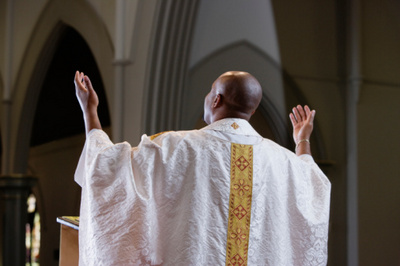
Some provocative food for thought from Msgr. Charles Pope on the question of what the modern microphone has done to the art of preaching:
I have discussed with brother priests before the concern I have at how too much microphone harms our preaching. Too much microphone causes the priest to adopt a gentle, lyrical style of preaching. His style too easily becomes suggestive rather than bold proclamation. The suggestive and conversational tone of many a modern preacher can, if not balanced by other things, amount to an “uncertain trumpet.” St. Paul warns, “For if the trumpet produces an uncertain sound, who will get ready for battle?” (1 Cor 14:8) It is a sure fact that many of the Catholic faithful have no readiness or appetite for battle and this can surely be laid at the feet of uncertain and uninspired preaching and teaching.
So perhaps a suggestion….No! a strong prescription! Use less microphone for the preaching moment and for the proclamation of the Word. It is a very different type of preaching that emerges from such a context, and I think, a far better, bolder and braver preaching. The lectors too will benefit from a louder and bolder style.
It is a true fact, not all churches, (especially the ones built after 1970 and until recently), are well suited for this option. But many are and we surely need bolder preaching today and trumpet that is more certain. Some of preaching simply comes down to the physicality of the moment. If a priest needs to project his voice he is affected by that very fact and his message inevitably turns bolder and braver. He will feel the very voice of the Prophets echo though him.
He’s written much more. Check it out.
But then Dustin Hoffman came forward to present Miller with an award. Hoffman paused a moment, then pushed the microphone aside, and spoke quite simply and plainly and eloquently, using nothing but his own voice.
The room fell silent. The clatter and chatter stopped. People leaned forward to hear every word. Hoffman clearly knew what he was doing, and why he was doing it — and the effect was striking. It made a big impression. I don’t remember what, exactly, he had to say, but I’ll never forget how he said it. Perhaps there is a lesson there.

